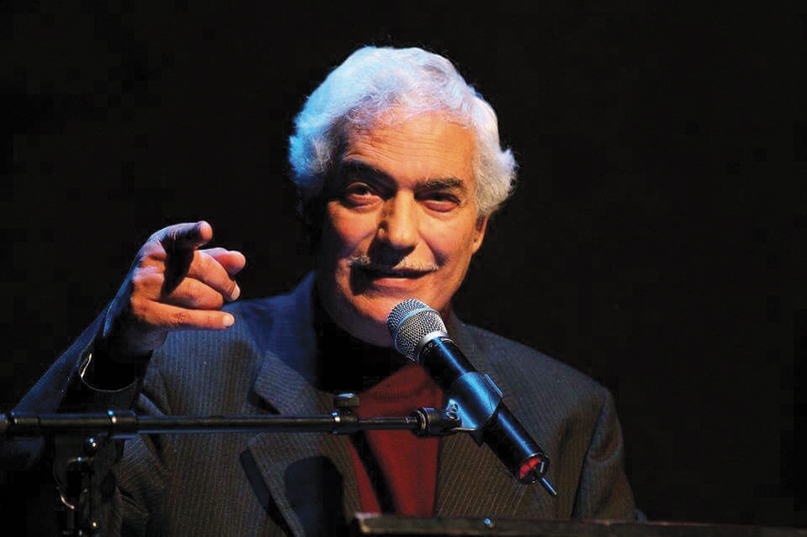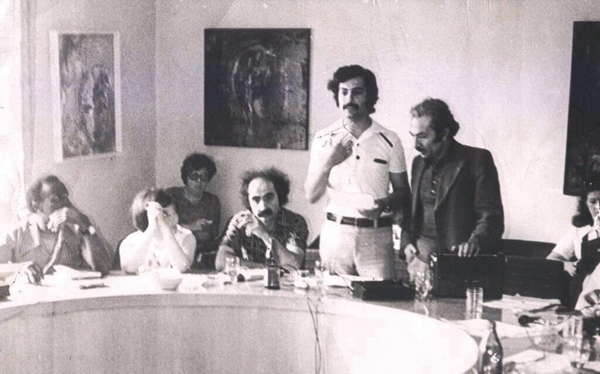
By: Yassar Dahbour
Ahmad Dahbour is a renowned Palestinian poet from the Revolution Generation. He was born in Haifa, Palestine, on April 21, 1946. On the day of his second birthday, his family was exiled from Palestine to Lebanon as Haifa fell into the hands of the Zionists, and the family ultimately settled in a refugee camp in Homs, Syria. Due to the harsh conditions and poverty that refugees faced, Dahbour did not complete high school; however, he was an avid reader and continued to teach himself, demonstrating an early gift for writing poetry in his teen years.
He published his first collection of poetry, The Predators and the Children’s Eyes, (الضواري وعيون الأطفال), when he was 18 years old, and his first complete book, which included seven collections of poetry, in 1983. His poem “The Tale of the Palestinian Child” (حكاية الولد الفلسطيني), written in 1969, appeared in his second collection, which bore the same title and gained him a distinguished place amongst prominent Palestinian and Arab poets.
Dahbour’s poetry derived its images and ideas from his own experience of living through the Palestinian catastrophe, the Nakba, and the consequent oppression and suffering in the refugee camps of the diaspora. His poetry, however, departed from subjective experience and reached out to and resonated with the masses. Many of his works became patriotic songs that were filled with the yearning to return to Palestine, glorifying the revolution, and empowering the poor and the weak to overcome the misery of their reality and to achieve victory and freedom. These songs, mostly written between 1978 and 2011, are still played and memorized by many.
In the late 1970s, Dahbour cofounded the musical troupe Al-‘Ashikeen (The Adorers), for which he wrote numerous songs dedicated to the Palestinian resistance. The songs and troupe were well received by both Palestinian and Arab audiences. Although Dahbour wrote most of the songs, the troupe’s music also included work by poets such as Mahmoud Darwish, Tawfiq Zayyad, and Samih Al-Qasem. Because of the band’s unprecedented success, efforts are still being made to revive it since it disbanded in the 1990s.
In addition to poetry and songs, Dahbour wrote a television series about a resistance figure, the Syrian preacher Izz ad-Din Al-Qassam. He also wrote numerous articles in various newspapers and magazines, ranging from daily columns to literary critiques. His work on the latter elevated his status to that of a distinguished literary critic.
Dahbour joined the Palestinian revolution in its early years as a war correspondent, writing for Fatah newspaper from the freedom fighters’ bases on the frontlines in Jordan. Subsequently, his destiny was tied to the revolution as he fought in battles in Jordan and Lebanon, eventually relocating from Syria to Tunisia, and finally back to Palestine. Although Dahbour returned to his homeland because of the Oslo Accords, he adamantly rejected the new reality it created – one without Haifa – by coining the term “the part of Palestine available to us” in reference to the West Bank and Gaza.
Dahbour worked as editor of Lotus magazine, editor-in-chief of Albayadir, general director of the Culture Department of the Palestinian Liberation Organization (PLO), and deputy minister of culture of the Palestinian Authority, the position from which he ultimately retired. He published 13 collections of poetry in two books, and efforts are under way to reissue his work, including some previously unpublished writings.
Dahbour was presented with the Tawfiq Zayyad Poetry Award in 1988 and was granted the Medal of the Order of Merit and Superiority by Palestinian President Mahmoud Abbas in 2012. He also received the Jerusalem Award for Culture and Creativity in 2015.
Dahbour passed away on April 8, 2017 in Ramallah.


